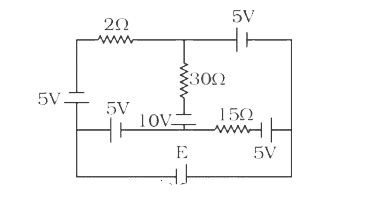A current i1=i10sinωt passes through a resistor of resistance R. How much thermal energy is produced in one time period? A current i2=−i0sinωt passes through the resistor. How much thermal energy is produced in one time period? If i1andi2 both pass through the resistor simultaneously, how much thermal energy is produced? Is the principle of superposition obeyed in this case?Solution in Gujrati
Step by step video & image solution for A current i_1 = i_10 sin omegat passes through a resistor of resistance R. How much thermal energy is produced in one time period? A current i_2 = -i_0 sin omegat passes through the resistor. How much thermal energy is produced in one time period? If i_1 and i_2 both pass through the resistor simultaneously, how much thermal energy is produced? Is the principle of superposition obeyed in this case? by Physics experts to help you in doubts & scoring excellent marks in Class 12 exams.
Updated on:21/07/2023Topper's Solved these Questions
- ALTERNATING CURRENTBOOK - HC VERMACHAPTER - ALTERNATING CURRENTEXERCISE - Objective 1
11 Videos
- ALTERNATING CURRENTBOOK - HC VERMACHAPTER - ALTERNATING CURRENTEXERCISE - Objective 2
7 Videos
- ALTERNATING CURRENTBOOK - HC VERMACHAPTER - ALTERNATING CURRENTEXERCISE - Worked Out Examples
8 Videos
- BOHR'S MODEL AND PHYSICS OF THE ATOMBOOK - HC VERMACHAPTER - BOHR'S MODEL AND PHYSICS OF THE ATOMEXERCISE - Exercises
46 Videos
Similar Questions
A capacitor acts as an infinite resistance for
View SolutionAn inductor, a resistor and a capacitor are joined in series with an AC source. As the frequency of the source is slightly increased from a very low value, the reactance
View SolutionA resistance of 20Ω is connected to a source of alternating current rated 110V,50Hz. Find (a) the rms current, (b) the maxium instantaneous current in the resistor and (c) the time taken by the current to change from its maximum value to the rms value.
View SolutionThe bohrradius is given by a0=ε0h2πme2 verify that the RHS has dimesions of length
View SolutionWhich of the following plotes may represent the thermal energy produced in a resistor in a given time as a function of the electric current? Figure

View SolutionTwo alternating currents are given by i_1 = i_0 sin omegat and i_2 = i_0 sin (omegat + (pi)/3)) . Will the rms values of the currents be equal or different?
View SolutionA current i1=i10sinωt passes through a resistor of resistance R. How much thermal energy is produced in one time period? A current i2=−i0sinωt passes through the resistor. How much thermal energy is produced in one time period? If i1andi2 both pass through the resistor simultaneously, how much thermal energy is produced? Is the principle of superposition obeyed in this case?
View SolutionWhich of the following plots may represent the thermal energy produced in a resistor for a given current as a function of time?
View SolutionThe rms value of alternating current which when passed through a resistor produces heat energy four times that produced by directed current of 2 A through the same resistor in same time is
View SolutionA current of 5Amp. exist on a 10 ohm resistance for 4min. How much charge pass through any cross- section of the resistor in this time ?
View SolutionIn the circuit shown, current through the resistance2Ω isi1 and current through the resistance30Ω is i2. The ratio i1i2 is equal to

View SolutionHeat produced in a resistance wire of resistance R on passing current is H cal/sec.Then current through resistor = ...... A.
View SolutionWhich of the following plotes may represent the thermal energy produced in a resistor in a given time as a function of the electric current? Figure

View SolutionTwo alternating currents are given by i_1 = i_0 sin omegat and i_2 = i_0 sin (omegat + (pi)/3)) . Will the rms values of the currents be equal or different?
View SolutionA current i1=i0sinωt passes through a resistor of resistance R. How much thermal energy is produced in one time period? A current i2=−i0sinωt passes through the resistor. How much thermal energy is produced in one time period? If i1andi2 both pass through the resistor simultaneously, how much thermal energy is produced? Is the principle of superposition obeyed in this case?
View SolutionThe rms value of an alternating current, which when passed through a resistor produces heat three times of that produced by a direct current of 2A in the same resistor, is
View Solution
